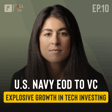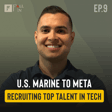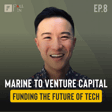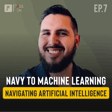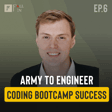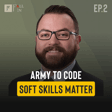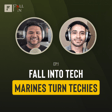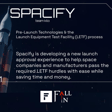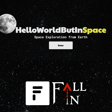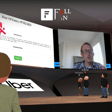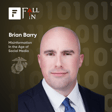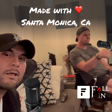Become a Creator today!Start creating today - Share your story with the world!
Start for free
00:00:00
00:00:01

Fall Into Tech #3: Jeff Otano - Marine to Tech Startups and Microsoft Software Engineer
Marine veteran Jeff Otano shares his journey from infantry to senior software engineer in this inspiring episode. Discover:
- Jeff’s transition from the Marines to Microsoft and startups
- The pros and cons of big tech vs. startup life
- Tips for breaking into tech as a veteran
- How to leverage military leadership skills in the tech world
- Insights on building your own tech projects and startups
Whether you’re a transitioning service member or aspiring entrepreneur, this episode offers valuable advice for succeeding in tech.
GUEST INFO:
EPISODE LINKS:
- Microsoft Software & Systems Academy
- DOD SkillBridge
- GI Bill Veteran Benefits
- Free Code Camp
- Treehouse
- Wellfound
- Udemy
- Coursera
- Convex
PODCAST INFO:
- Podcast website: https://www.fallintotech.com/
- Youtube
- Apple Podcast
- Spotify
- Zencastr
SOCIAL MEDIA:
HOST INFO:
Transcript
Introduction and Podcast Focus
00:00:02
Michael Rodriguez
Hey, welcome to the fall into tech podcast hosted by Jamil Mattin and myself, Michael Rodriguez, two Marines turned techies on this podcast. As you know, we chat with fellow veterans about their journey from military to technology, as well as other tech professionals to help you succeed in tech.
00:00:20
fall_in
Yeah, that's right. um you know ah We suggest that you tune in weekly for guest interviews, where we discuss specific tech roles, career paths, and tips for succeeding in tech.
Meet Jeff Otano
00:00:34
fall_in
um This week, we have Jeff Otano. Thank you for joining us. um Jeff is a a marine veteran, turned senior software engineer, and startup founder. um And he also happened to be fall in hackathon's previous judge. So yeah, Jeff, thanks again for joining.
00:00:53
fall_in
We'd like to start things off by asking our guests like a um but by asking your guests to tell the listeners a fun fact about themselves. So um yeah, we'd love to hear a fun fact.
00:01:03
Jeff Otano
Yeah, totally. Yeah. Thank you guys for having me on. Um, super exciting what you guys are doing. So I guess quick, fun fact. Um, so I used to be, it used to be a big runner, uh, huge in a ultra running marathons. Um, and then I got taken over by pickleball, which is like the nerdiest thing you could do outside of running. So yeah, I played probably like a 20 hours a week of pickleball. It's my new cardio. So yeah.
00:01:31
Michael Rodriguez
Nice. I've been hearing a lot about pickleball actually. I've been meaning to try it out. Maybe this is the sign I need.
00:01:37
Jeff Otano
Yeah, it is the most fun you could do and you burn an insane amount of calories. So that's really why I do it.
00:01:44
Michael Rodriguez
Nice.
Joining the Marine Corps
00:01:46
Michael Rodriguez
Yeah. And so Jamil mentioned your Marines. So can you just tell us first, I guess, why you joined the Marines and what years you served? What was your military occupation?
00:01:55
Jeff Otano
Yeah, totally. So I mean, I was the first one to join out of my family. So I'm a first generation American parents, Cuban and Colombian. Um, and they were like, you're going to be a communist if you join the Marine Corps. And I was like, no, it's going to be a good time. I swear. And so, um, I was probably like 17 when I made the decision in high school and it was really driven by like, I just want to do the hardest thing for me. I wanted some structure in life and, um, Yeah, I didn't choose an easy job. I was like, I want to go Marine Corps infantry.
00:02:27
Jeff Otano
Sounds like a good time. So I recruited was like, Oh yeah, there's plenty of spots for that. So yeah.
00:02:32
Michael Rodriguez
I wonder why.
00:02:33
Jeff Otano
Yeah. I joined in 2013 and I got out in 2018. So five years.
00:02:39
Michael Rodriguez
Awesome. Yeah. I guess during your time, you know, people say you always remember the, the good times, uh, mostly is there any specific worst thing or best thing about the Marine Corps you remember?
00:02:51
Jeff Otano
Yeah. I mean, I think. It's probably uniform across every veteran, but the friends you make, man, it's like incomparable, right? You go through so much stuff together that those are bonds. Like I still talk to my boys all the time, even though we're all over the country. um So I'd say the best thing is like the buddies that you make, worst thing. is you could you kind of have a lack of control over your life while you're in the Marine Corps, you know, like you can't really go and study and learn other things because there's not really a lot of time for that. And so, you know, I always encourage everybody to like push as much as you can to try to learn stuff outside of just your job if you have time.
00:03:29
fall_in
Nice.
00:03:29
Michael Rodriguez
Definitely.
Marine Corps Experiences
00:03:31
fall_in
It's interesting. like I thought it was such a coincidence when we first met that you also happen to be part of Marine Corps security forces and it's like a sub-session out of the infantry. um And it's so badass, right? The infantry has like um You know, I think 8th and I, like the Sound Drill Platoon is all infantry marines that get plucked out of SOI. And then there's like, there's a security force, little cohort.
00:03:56
Jeff Otano
yeah
00:03:56
fall_in
um How did you hear about security forces initially, instead of just going straight for a...
00:03:59
Jeff Otano
Yeah.
00:04:01
fall_in
Yeah.
00:04:01
Jeff Otano
Um, so yeah, my crew was like, Hey, you'll be infantry, but you can like possibly guard the president. And I was like, that's cool. You know, like, I've never been to DC.
00:04:10
Michael Rodriguez
you
00:04:12
Jeff Otano
It'd be cool to like go guard the white house. Um, that is not what I did at all. I'm guessing it's cause I have like a Cuban background. I really don't know why I didn't get the clearance to go. Um, but yeah, s SOI was interesting cause they were like, You know, I was a security force guy. Normally you don't get selected to do anything other than be an 11. Um, and so they asked the group of us like, Hey, who was good at math? And I was like, Oh, I was pretty good at math. They're like, cool. You're going to go be a 51. And so I was like this unicorn of security forces grunt 51, um, which kind of sent me up for failure when I hit the fleet. Cause you don't do any like 51 stuff while you're at bigger Washington, you know? Um, but I just try to humble myself and like, how much can I learn from the guys around me?
00:04:57
Jeff Otano
Cause you come in as a corporal from security forces and you know, if you were a good dude and then all of a sudden you're like, well, now you're a leader of 51s. You're like, well, I've never led 51s. I haven't done demo or rockets in like two years at least. So yeah, it was a pretty interesting journey of like, it's just constant imposter syndrome my whole career. So yeah.
00:05:20
fall_in
Yeah, I mean, ah kind of just ah just to stay on this chapter a little bit. Did you have to earn that respect over time? Or did you have to like maybe learn from others and kind of humble yourself? um you know You're coming in default NCO. You got that rank where people just have to give that respect, but you don't you didn't have that kind of um job experience ah for that specific role.
00:05:40
Jeff Otano
All right.
00:05:48
fall_in
How did that dynamic play out?
00:05:50
Jeff Otano
Yeah, I, um when I hit the fleet, it was, I mean, I was nervous, you know, like anybody else. I'm super intimidated by everybody just getting run around by first sirens all over the place. And so I literally went up to every guy in my squad and I shook their hands and I introduced myself and I told all the senior Lance Cooley's like, you know, I'm here to learn from you for now, you know, teach me what you can so I can lead you. And they took that very well is like this guy's not coming in like he knows everything and it's funny because we actually had another Oh 351 come in from security forces, which is crazy. He came in from Georgia And he was the opposite So I got to see like what happens on the other side of the spectrum because he came in like I'm a corporal You're gonna do what I say
00:06:37
fall_in
Yeah, I hate that.
00:06:37
Jeff Otano
And god zero respect, dude. Yeah, I was like, yeah, that's not the way to do it. And we don't know this job, you know, you got to kind of own up to it and like, go study your manuals and figure out what your job is. But yeah, a lot of it was like, you know, yeah, I was in charge at the time, but I was asking a lot of questions from everybody, like, what do I do here? And, you know, if I get smoked by somebody, then just pay the consequences.
Transition to Tech through Education
00:07:03
Michael Rodriguez
Foreshadowing, I think that's a good attitude to have in tech as well.
00:07:03
fall_in
Yeah.
00:07:06
Michael Rodriguez
Just being able to just ask questions, just learn from everyone around you.
00:07:07
Jeff Otano
Yeah.
00:07:10
Jeff Otano
Totally, totally.
00:07:12
fall_in
Yeah, I feel like I've got like a million questions for your time in the Marine Corps. Just have that overlap with, you know, being O3s. But, you know, and what made you want to get out of the Marine Corps?
00:07:24
Jeff Otano
Yeah. You know, it's funny. I was on the edge of Sabina 51. Like you're pretty comfortable with demo. And I was like, Oh, I could go like be EOD. Like that'd be a cool assignment. Um, it was like a 90 grand signing bonus at the time, which for us is like, you know, three years pay. Um, and so my, I put in a, like, uh, like I wanted to go EOD. I told my command, but they were like, Hey, it's going to be like a year and a half and you're going to have to read lists and go on another deployment. And I was like, nah. I don't know if I want to do all of this again and go to Oki and sounded kind of boring to me. And so my brother actually was doing web dev at the time. And he was like, literally just building websites as a webmaster. And he was like, go check out free code camp, see if you like this. And I built a cat website. And I was like, this is the coolest thing ever. Like I can create things. um It was so different from being a grunt, you know, it was like, like being able to create things without having to, you know, hurt my body.
00:08:21
Jeff Otano
In the meantime, and I'd always got it in like nerdy, you know, I love to like Tetris and computer games and play video games.
00:08:23
fall_in
Yeah.
00:08:28
Jeff Otano
And I was like, this seems like a cool path. And then I looked up starting salaries for software engineers and I was like, yeah, I should go do this. Yeah.
00:08:38
fall_in
Nice. um And so it was kind of like your brother. That was like the initial touch point and you kind of just start peeling the audience from there.
00:08:44
Jeff Otano
Yeah.
00:08:47
fall_in
um That's awesome.
00:08:48
Michael Rodriguez
What? a That is pretty cool. What you said free code camp, correct?
00:08:55
Jeff Otano
Yeah, yeah. I think it was like Code Academy, one of those like free ones.
00:08:59
Michael Rodriguez
Yeah, no, I definitely have used that recommend that for listeners as well. um Is there any other resources used besides that as you kind of start to get going and maybe before you got that first job?
00:09:10
Jeff Otano
Yeah, absolutely. So I mean, you know, I didn't just go from like free code camp to job. My intention was I had gone to, I think it's TRS. Is that like the course that we do on our way out? And they talked about the skill bridge programs.
00:09:24
Michael Rodriguez
Transition readiness service.
00:09:27
Jeff Otano
And so MSSA was one of them at the time. So it's Microsoft Software and Systems Academy. And so it's essentially like, And you can take six months of your contract and go learn how to code. And so I looked up the program and they were like, oh, it's all C sharp and sequel. So I was like, I'm going to go learn C sharp because that's what the program does. And I ended up using a lot of Microsoft's free learning material. So there was this one teacher, Bob Tabard, that I used to just like he was like my hero because he could teach me how to code and I would understand it.
00:09:59
Jeff Otano
It took me so long to understand what an array was. It's like, what the heck is a variable? like It makes no sense at all. And when you think about it now, you're like, oh, you know it's just kind of like another language in your brain. But yeah, I learned a lot from ah Microsoft's free material. They have so much online. And so he's actually now an evangelist at Microsoft.
00:10:22
Michael Rodriguez
Awesome.
00:10:23
Jeff Otano
Yeah.
00:10:23
Michael Rodriguez
Okay. So when you were kind of going through this, was there anything you felt was lacking or it wasn't really available to you that you wish existed at the time?
00:10:33
Jeff Otano
Yeah, I did not have a mentor at all. um Every other grunt around me that I was nuts because I was on guard duty at the time because I told them I was getting out. um And so they just put me on like 51 area guard. And so I was like, so
00:10:47
fall_in
51 area baby.
00:10:48
Jeff Otano
Yeah. Yeah. I'm just SOG, like literally reading coding books, not understanding anything.
00:10:53
fall_in
Not shit.
00:10:55
Jeff Otano
Yeah. And, um, everybody around me is like, you're nuts. Like you're a nerd, you know, um, even like staffs aren't just telling me like, what are you doing, man? Um, And so I really wish that I had a mentor that was like, Hey, you can do this. Here's some material. Like let's bounce ideas off of each other. And so like, there was no real like vets in tech or anything like that to help you out. You're on your own, you know?
00:11:20
Michael Rodriguez
I definitely hear you. I feel like that's what I kind of said as so far as what was lacking was just someone to talk to about tech that was already in tech.
00:11:26
Jeff Otano
Yeah.
00:11:28
Michael Rodriguez
Because again, no one I knew either was going into software engineering, um especially when none of us know how to code.
00:11:32
Jeff Otano
Yeah.
00:11:35
Michael Rodriguez
um So I guess that's probably part of the reason also we're starting this podcast too.
00:11:35
Jeff Otano
Yeah.
00:11:38
Michael Rodriguez
So hopefully people can reach out to you and us on here.
00:11:42
Jeff Otano
Yeah, totally. I mean, this is like phenomenal. I wish I would have had this podcast to listen to and like keep me motivated because outside of that, it was like, I was going through a divorce at the time. It was like really tough. And I was like, just trying to change my life, man. And I'm sure, you know, there's plenty of other vets or guys getting ready to get out that are going through tough times. Like you can flip it, you know, within a year you'll be making six figures if you want to.
00:12:07
fall_in
So heavy stuff, man.
00:12:08
Jeff Otano
Yeah.
00:12:08
fall_in
um I guess I want to tap into some like potential advice that you may have ah if you were to give to your younger self. you know Think back 2013, your EASN, you're taking this bootcamp from Microsoft. It's Microsoft, right?
00:12:26
Jeff Otano
Yeah, yeah.
00:12:26
fall_in
Yeah, yeah. So yeah, what advice would you give to your younger self im trying to break into this industry?
00:12:32
Jeff Otano
Um, so I would totally have told myself pursue what you think is fun. So I spent so much time doing all these tutorials that I never finished and buying Udemy courses that I never did. Um, and I totally would have been like, what are you interested in? What are you like, what excites you? Cause you'll go and want to build that and like want to come back to it the next day. Um, and that's what I do now, you know, is like, I, even if my day job isn't as entertaining, I get to go and pursue my passion kind of in the evening or when I have time on the weekends. And so any like new aspiring dev, like go, if you have an idea, try to build it, you know, figure it out. And a lot of the times that tutorials don't help you as much as you like looking at documentation or just banging your head on the keyboard is so much more satisfying than getting the answer in front of you.
00:13:25
Michael Rodriguez
Definitely.
00:13:26
fall_in
Yeah.
00:13:27
Michael Rodriguez
And with, I was gonna say with, um you know, we kind of talked about we used for the Microsoft Bootcave and stuff.
00:13:27
fall_in
Um, yeah, good.
00:13:35
Michael Rodriguez
There's so many different things out there now with on YouTube or Udemy courses or bootcamps where you go to college and get a computer science degree. I guess if you had to redo it, would you change anything? Or would you recommend a specific pathway this day and age?
00:13:55
Jeff Otano
Yeah, that's, it's tough, man, because everybody's kind of on their own journey and you we all learn different ways. But I would say like, explore it all. Like, if you like school, you like the long form of education, like maybe go dive into that. If you You know, learn quickly through projects or you are more of like a theoretical learner. You want to go do, you know, like late code is fun for you. Then I go explore what is the most interesting at the time. Um, because yeah, I don't think there's one path that can help everybody, but definitely explore all the resources. Cause what maybe helped me might not be what help others, what helps others. So yeah.
00:14:35
Michael Rodriguez
true
00:14:37
fall_in
um Could you talk about how you got your first role in tech after leaving the
Working at Microsoft
00:14:42
fall_in
Marine Corps? So you got done with this boot camp and then yeah, talk to us about that first journey.
00:14:45
Jeff Otano
yeah Um, I'd say, I mean, I feel extremely lucky. The, the MSSA program at the time, they'd set you up with interviews with Microsoft, um, at the end of the bootcamp. And so it was like the luckiest thing I could have ever had. We do like an initial round at the end of the bootcamp, kind of like maybe two weeks before graduation.
00:15:02
Michael Rodriguez
That's true.
00:15:07
Jeff Otano
Um, so someone comes down from Microsoft to say Diego where my classroom was at the time. They give you like an initial behavioral interview, if that's like a pass on culture, then they literally flew up like there's 11 of my class. I think 10 of us went up to Microsoft and did. ah four hours of interviews with a bunch of different teams and it's all like lead code style questions so like I had like maybe four months of coding experience and it's like now you're solving lead code you know mediums which is insane to me but that's literally all I had been trying to do because I figured like this is what an interview is like so I'm just gonna try to do this
00:15:50
Jeff Otano
And I was lucky enough to get two offers from Microsoft at the time which is mind blowing. I remember like tearing up on the way my, my manager at the time for my first role he had called me the next day, which is like non It's not normal to do that. Normally it takes like a week or two for them to call you back. He called me the next day and he's like, Hey man, I want you to come join Outlook if you'll come be with us.
00:16:14
fall_in
oh
00:16:15
Jeff Otano
And I was like, uh, yeah. And so I just, I hung up and I was like tearing up on this train, getting ready to like go to the airport. It was wild, wild experience, but I think I was very lucky. That's not the normal path, right? You don't normally get set up with Microsoft because they have five walls of recruiters to get to. um So I was very fortunate in that way.
00:16:36
fall_in
Uh
00:16:36
Jeff Otano
The first role is always the hardest, but after that it gets a little easier.
00:16:40
fall_in
oh. Yeah. So talk to us about like what you did working with and such an incredible story by the way. So um yeah, I hope ah listeners gain inspiration from that. But um yeah, talk to us about what work you've done um on Outlook. You can share any color on that.
00:16:59
Jeff Otano
yeah Yeah, so I was on the Outlook team for about four years. So when I started out there, I was literally working on the mail app that comes in box with windows. So we have like, I think it was like 330 million users. So anything you change is a big deal, right?
00:17:16
fall_in
change.
00:17:18
Jeff Otano
Like we're going to change this button color. We'll make sure that it's like accessible because we have blind users, like a very large percentage. Um, and so I started off like, uh, I will say, so I learned C sharp. The whole project was in C plus plus that was 15 years old and custom built by Microsoft. So I had no idea what the hell was going on anywhere. I didn't know what MVC was. I didn't know how to do a code review. I didn't, I like nothing, man. Um, and so my first like three months were just like figuring out like what to say at standup, you know, like I had no,
00:17:55
Jeff Otano
What was going on? And I met i remember my first day of work, I got there at 7.30 because I thought it was like kind of normal time to show up to work. And then the PM shows up at 8. And he's like, Hey, man, why are you here so early? And I'm like, I don't know, you know, I'm used to the formation of 6.30. Like I just got out of boots last week. a Stella terminal leave, like working at Microsoft. And he's like, your manager doesn't show up till 10. So just sleep in. and So that was like my first introduction to culture and tech. And yeah, it was just like, my manager was like, don't set your computer on fire for the first six months. And you're good. I was like, okay, thanks. You know, I don't think most companies are like that. I think it's big tech. So they're kind of used to a slower pace.
00:18:47
Jeff Otano
But I was lucky enough that I think it was maybe like five months into that role. So I was starting to get a hang of C++ plus plus and figure out what pointers were. And, you know, it was like, everything's new to me. Coding's new. And we switched. The whole team was like, hey, we're going to write this project in React Native for Windows. And so React Native was new. And it had never been translated to Windows, right? React Native is normally just like mobile iOS and Android only. So I got to be part of this like revolution of rewriting the open source repo of React Native and writing React, which none of my team knew. So I got so lucky that we all started from zero.
00:19:26
Jeff Otano
And I learned React super early in my career. And we've worked on that project for maybe a year before they were like, hey, this isn't going to work. Everything's going to web. And so they moved us all to Outlook Web, which is written in React. So it was a pretty easy transition from React Native to React. And then I was on web for two years before I joined my first startup. So um yeah, React and TypeScript is way easier than C++ plus plus at the time. so Yeah.
00:19:57
Michael Rodriguez
Now for the users or for the listeners, obviously. So there's this thing called fang fang companies, right?
00:20:01
Jeff Otano
Yeah.
00:20:03
Michael Rodriguez
Which is, I know some names have changed since recently, but usually it stands for what Facebook, Amazon, Apple, Netflix, Google, just the largest tech companies.
00:20:11
Jeff Otano
have yeah
00:20:14
Michael Rodriguez
ah Microsoft is in there as well.
00:20:15
fall_in
Thank
00:20:16
Michael Rodriguez
Um, there's different man, whatever. Um, you mentioned you went to startups, but before we get there, can you kind of give.
00:20:22
fall_in
you.
00:20:25
Michael Rodriguez
typical day in the life for someone who may want to work at a fang company. I think you mentioned some times and daily stand up, just what it normally looks like, how things get done.
00:20:32
Jeff Otano
Yeah. Yeah. Yeah. I mean, it, it, it can vary from team to team, but, um, it's honestly, I mean, it's pretty awesome. Do you, as far as like work life balance goes there, Microsoft is well known for having a good work life balance, meaning that you don't work super long hours. Like a 40 hour work week is pretty normal. A 30 hour work week is pretty normal. Um, so you'll, you know, standups normally at like 10 or 11 a.m. Um, you give a quick update on what you're working on. That happens daily. You might have meetings throughout the week with maybe a project manager to discuss a feature you're working on. ah But most of the time, you're just left alone to do your work. And so if you're working remotely, there's nobody to keep you accountable to do your work. um You just kind of have to do it. And it shows in the amount of output that you have. And so that's really what you're evaluated on is the kind of features that you're creating.
00:21:27
Jeff Otano
at a big tech company. And so when you do work somewhere as big as Microsoft or Facebook or Amazon, you get very small chunks of an even smaller chunk of what is Outlook. So when you think about me working on Outlook calendar, so you know Outlook is mailing calendar, these two massive ah projects, like literally millions of lines of code.
00:21:49
Michael Rodriguez
you
00:21:53
Jeff Otano
Then I will work on, let's say my whole team of six engineers is working on how to create a new event. Right. and So literally just this one pop up and then I might be working on. You know, grabbing some new data for this button to think about when you click on creating a new event, whether that's availability or scheduling or maybe the color, if you want to customize your calendar. um So typically in a massive company like that, you're working on the tiniest piece of this monstrosity of a project. So, and that will take up, you know, you'll have that project for two weeks, like go change the color on this thing.
00:22:34
Jeff Otano
And it sounds like simple, right?
00:22:34
fall_in
down.
00:22:36
Jeff Otano
Because you could just do it. But you have to make sure that you're doing it the exact way and write perfect tests. And then it goes through like, like four waves of test users before it ever hits like a normal public consumer. So I might have changed that color. And now it'll be You know, if I changed it in January, Jamil wouldn't see it until May that I made that change because it has to go through all these waves of testers before it ever gets anywhere. And if it, if something doesn't work on the way, they'll kick it back to you and then it'll be another, you know, four months of waves.
00:23:11
Jeff Otano
So yeah, yeah, it's kind of wild.
00:23:13
fall_in
She is.
Startup vs Big Tech Culture
00:23:15
fall_in
So what ultimately made you decide to leave Microsoft?
00:23:20
Jeff Otano
Yeah, um so I guess a little secret. I was working. um I've always kind of been like the entrepreneurial mindset. So at the time while I was at Microsoft, I was renovating my basement. So during COVID, so I was there from 2018 to 2022. I've left Microsoft Redmond area. So up in Washington, when COVID happened, everything went remote. And so I moved out to Colorado because my manager was like, we're not going to office for a long, long time. So just live wherever you want. um So I moved to Colorado to Springs where I'm at now, and we bought a house. And so my basement was like wrecked. I had to redo everything. and
00:24:02
Jeff Otano
I needed a tile saw and I didn't want to go buy one from a Home Depot and renting one was like $130 a day. So I was like, I could just buy one and eventually it'd be cheaper anyways. So I had an idea of like, why don't, why can't you just rent tools from people? You know, like my neighbor might have a tile saw and he might want to rent it for 20 bucks a day to me. Um, and so I looked up technology, like, does this exist right now? And there was one project called spare tools with a Z that existed at the time. Um, and I literally cold emailed the email I saw on the website and I was like, Hey man, I just had the same idea as this project that you created. Do you need help? Um, and he messaged me back and he was like, you know, I had an offshore team build this thing for me, but, um, I don't have any devs maintaining it. Like if you want to come on.
00:24:53
Jeff Otano
and work on it short. And so that was like kind of my first taste at owning a project. He just gave me free reign to do whatever I wanted. So I had to go in there and update a bunch of packages. And I realized how much fun that was. That was up till like one, two o'clock. Like most nights working on this thing outside of work hours and It was just so much fun to be able to touch things and not really worry about like the whole testing process or what is this ever going to get out. Like I could literally fix it that day and then submit it to Apple the next day. And so that's really what drove me to think about leaving Microsoft was I love the security blanket that they provided, but I didn't feel like I was advancing my career as much as I could have been.
00:25:39
Michael Rodriguez
Gotcha. Yeah. You kind of mentioned some differences there between, you know, big tech, that's what they call it. And maybe a startup type company.
00:25:46
Jeff Otano
Yeah.
00:25:47
Michael Rodriguez
Is there anything else besides the how long you can, how long it takes to release something, right? You can work on it tonight and it'll be released to us tonight, right? um Is there anything else you found that you enjoyed more in startup land than big tech?
00:25:59
Jeff Otano
Yeah. Yeah.
00:26:05
Jeff Otano
Yeah, I mean, there's this ability, I guess, kind of demand to wear every hat that you can while you're at a startup. So you might be engineer number one, but you're also a PM at the same time because you have to manage your own tasks. And you also might be a bit of a designer because the designer didn't get to that feature you're working on. and Um, the involvement in the process of developing a project was kind of addicting to me. Like I liked having this full context of what was happening when you're at a big tech company, it just all comes top down. Like VP says he wants to build this thing. And then that comes down to.
00:26:42
Jeff Otano
the general manager who's in charge of managers and then it goes to your manager and then it comes down to you eventually, right? That might take months as well. So it was, there's this unique ability to go from, I have this idea and go build it within, you know, 20 minute conversation with the CEO or CTO, whoever it was. So yeah, it's just, everything moves so fast. And with that comes downfalls too. You make a ton of mistakes, but you also learn a lot faster because you're making those mistakes. um So that's probably one of the biggest differences that I found between big tech and startups was you just, it's so agile. You can do kind of whatever you want as long as it's within the frame of the project that you're working on.
00:27:25
Michael Rodriguez
And with those, I guess a question someone might have after that is the hours, right? So you kind of wear more roles in the startup. You have maybe more things you touch. Do do the hours change and is it kind of more secure job wise pay wise to be at big tech versus startup?
00:27:44
Jeff Otano
Oh, totally, totally. Yeah, startups are volatile, of course, right? Because they're new projects. And the hours may vary from startup to startup. It's like the culture can be kind of wild. But the first startup I worked at, I was probably working from like 8am to 10pm every night, which is not making my wife and son very happy. ah With that came a ton of learning. So there's some pros but it was mostly con as far as work hours goes. So that's where the work life balance goes out of the window. My benefits were not the same right I didn't have Microsoft insurance anymore. My pay was not the same I didn't have stock that Microsoft provides that I can sell right because they're a public company.
00:28:27
Jeff Otano
And so yeah, they promise you this upfront equity of like, I think 1% at my first startup, which is pretty massive for a startup equity. um But that could just be nothing, because the startup might go not go anywhere. and so There's definitely a ton of risk involved to joining a startup and that startup actually I just got an email that they, they went down yesterday. So they're like no longer a business, and that is very possible if you're still at that startup like now you're getting laid off and you're back on the market with no security blanket, whereas at a big tech company.
00:29:02
Jeff Otano
It takes a long time for you to get fired. If Microsoft's not going anywhere, they're not going to run out of money. um And so, yeah, that's huge. And you can easily get you know let go the next day if for some reason the founders you know want to save money for some for something.
00:29:19
fall_in
um um Sweet man, I want to kind of jump into a similar question we asked at the beginning where we asked about you know your your like favorite and worst parts about the Marine Corps. you know Bringing it back to tech, what would you say are the best parts and worst parts about it?
00:29:37
Jeff Otano
Yeah, yeah, I'd say, I mean, my favorite part about tech is just this ability to create. You can just build anything if you know enough. And if you don't know, you can go, I mean, there's so many resources, I can go watch a YouTube video on iOS development and build an iOS app. So it's kind of addicting to be able to just build on any idea that you've ever had. I mean, the world is run by tech nowadays. I'd say the worst part, and maybe personally, is that I sit at my desk a long time, like all day long, and I have to be really intentional about keeping up with my health. And so that's probably the hardest thing for me is there's no, like, nobody's going to make you PT. Nobody's going to keep you in shape. You know, there's plenty of
00:30:23
Jeff Otano
um opportunity for you to just sit at your desk and do more work if you want to. You don't have to go outside ever, so um that's probably the hardest part for me. Other than that, there's a lot of different cultural aspects to working in tech, right? They tend to lean a certain way when you're at a tech company and say you have to be very mindful of you know, making sure that you assimilate with that environment. And so it might not be exactly who you are, whereas in the military, you know, everybody is themselves all the time. It doesn't matter. And so that's also was kind of a big transition for me coming into tech was like, you know, you kind of have to wear your work mask and that's okay. You know, everybody does it. So
Startup Experiences and Advice
00:31:08
Jeff Otano
yeah.
00:31:10
Michael Rodriguez
And um I guess before we hop off the your tech role stuff, we talked a little bit about kind of day in the life at Microsoft and specific roles you were in. You were in a few different startup roles, even co-founder of some of these. Can you go a little more in depth of what some of these companies are? Day in the life, what you've done there?
00:31:31
Jeff Otano
Yeah, yeah, totally. So the first startup I mentioned where I was working those late hours called Jam and say they were actually kind of like a podcast startup as well. So they would create these short form kind of like sound bites and they build you out a playlist and then you could send it to yourself at any time of the day. So. every morning at 8am I'd get this small playlist while I'm brushing my teeth that I could listen to different news about tech or, you know, like beekeeping or all these random topics, news, whatever it was. So it's a really cool idea to me and very foreign because I'd never worked in the audio space before. So that was my first startup. I was there for about eight months.
00:32:14
Jeff Otano
And it was a great experience. I was the first engineering hire and I actually got to teach the CTO who had been a VP at LinkedIn, VP of engineering at LinkedIn. And so he taught me a ton about leadership and tech. And I was teaching him some React at the same time, because he didn't know React. He had not been coding for a long time when you get that high up. um but the work hours were not great as I mentioned. And so eventually I had to leave and I joined a startup called Pathmatch, which was essentially like LinkedIn for Gen Z. So they would try to take all of your college experience and internships and build this beautiful profile. And then on the other side, there was a recruiter product that would try to match what the recruiter was looking for with the skills that these students had to try to find them and entry-level roles.
00:33:04
Jeff Otano
So it was a pretty good idea. The CEO had been in recruiting for 20 years, and so she had a lot of experience around that subject. But it wasn't the best tech leadership, because it's really hard to lead a tech company when you've never really been in tech. And so I joined initially as a founding engineer, and then eventually was the head of engineering at that company. So I was leading a team, I think, in our Biggest was nine engineers and then eventually dwindled down as we ran out of money. It just happened, I think last year.
00:33:40
Jeff Otano
So yeah, that role ah was really cool to be able to flex some of my like Marine Corps leadership skills, but in this tech environment. So a lot of what I took from the Marine Corps was, you know, if you care about your guys, they're going to perform for you. And that carries on pretty well into tech. If you care about people's tech careers and what they want to do, they're going to perform the tasks that you want them to do. And so I had a great time leading engineers and doing engineering myself, a lot of the infrastructure decisions were foreign to me, but you know, you just do the research. You can test things out at a startup. It's so flexible. Like we want to change, you know, this new styling tool that we want to use. Like we went from using Chakra UI to Tailwind because I was like, I think Tailwind is a better decision here. So let's start using it. And it worked out really well.
00:34:31
Jeff Otano
So that was super unique to have that kind of power and like be able to apply it directly and see users like are happy with, oh, now we have this new mobile experience because of Tailwind. So that was extremely intimidating, but also really gratifying to be able to grow a product with not just what I'm building, but with other people are building as well.
00:34:52
Michael Rodriguez
That's awesome. And I guess um with these startups, so this is, I guess for me, um someone like me who you know knows how to code, works at a very large company, but at the end of the day, my interest really is in startups as well and trying to create my own startup. What kind of tips or advice would you give to someone who's, you know, keeps kind of saying they want to do it and just hasn't done the leap yet, I guess.
00:35:17
Jeff Otano
Yeah. Yeah, yeah. um I mean, so there's a website out there called The Well Found. And so it is essentially the job board for startups. And so what I was doing for a while was like, just trying to find a project that I was interested in before I applied. And so a lot of them, I mean, startups can pay pretty well, which is nice. um There's not you know a lot of backing to the equity that they offer. So you have to be very mindful of that, like don't get big eyes when they give you you know you own two hundred thousand shares of this company like it could be nothing right so just find projects that interest you and you have to be super specific on the culture because the culture at a startup matters a lot more than it does at a giant company um the CEO could drive you crazy or you know you'd have teammates and there's literally nobody else you could go to you can't really switch teams across the company you are the team
00:36:15
Jeff Otano
And so you have to be really mindful about during interviews, like, am I going to love working with this person? And if not, then I'd probably like, let's move on to the next startup. And you have to ask a ton of good questions about, you know, what does their runway look like? Do they have enough money to keep us up for three years if we don't make any money? um You know, what is the annual of recurring revenue? You get a lot more like businessy. because it matters a lot more. If this business isn't doing well, I can have no job in six months. So.
00:36:48
Michael Rodriguez
That makes sense. And I know you mentioned you kind of co-founded a startup app as someone who kind of wants to dive into that world um and maybe not work for a company or startup and just want to start their own thing.
00:36:56
Jeff Otano
Yeah.
00:37:05
Michael Rodriguez
Is there anything specific you would do?
00:37:10
Jeff Otano
Yeah, totally. I mean, so right now I'm starting this app called Skiba and it's essentially like Strava for pickleball. So if you guys haven't used Strava in the past, it's like a digital communities slash like data analytics for your workout data. And so this Strava has this really rich environment that gives you a bunch of different insights on like how you're running is doing and gives you these beautiful maps. And they do a really good job at facilitating a community. So I go on a run.
00:37:44
Jeff Otano
And then I come back, I log it on my watch, and then someone gives me a kudos, and I get this like little rush of, you know, endorphins like, Oh, somebody liked my run, I feel acknowledged for that. A lot of people will say like, if you don't log your run, it doesn't count, which is like hilarious. It's because you know, we kind of want that uplifting kudos. And so I'm i'm building a similar product before the pickleball community. Pickleball is a super social sport. Everybody's really kind and there's no place for you to
00:38:16
Jeff Otano
kind of have that digital community outside of the friends that you play with. And so I would say if you are looking for starting your own idea, like find a gap in something that you're interested in and then just start attacking it. I literally was like, I'm going to start this app today. And then I like opened up expose, like install process and I'm going to start a new project. Okay, what back am I going to use? Like, I don't know. Let's just go figure it out. Like, so right now I'm using convex dot.dev if you guys haven't heard of it. Super cool technology. We giva actually just got accepted into their startup program, which is really cool. We get like six months of free resources. So shout out to convex.
00:39:00
Jeff Otano
But yeah, I just just get started, man. The things will come over time. like Start building it and then talk about it to people, will talk about it to your Dev buddies. like I have a good friend that I've been coding with for about four years. And he was the one that taught me how to play pickleball. And so I was like, hey, man, do you want to work on this with me? And he was like, sure. you know like I was like, eventually we'll figure out what equity looks like. But it doesn't really matter until this thing is something that's worth ah that has value at all.
00:39:31
Jeff Otano
And so I would say just jump in, start building and you
00:39:35
Michael Rodriguez
Thank you.
AI in Coding
00:39:36
Jeff Otano
know the designs will come later.
00:39:38
Jeff Otano
Don't be critical of yourself. I have zero tests on my project right now and I'm kind of okay with that. So like I have it on test flight and I'll play with it. And if it breaks, like I can just go fix it like 20 minutes later and I'll have a new build out. So that was kind of some of my biggest learnings from startups is nobody really knows what they're doing. So you have to just go and figure it out. And eventually, you know, if it's a good enough need for people, if you're satisfying a problem, it will grow kind of organically and naturally.
00:40:12
Michael Rodriguez
Gotcha. So for everyone listening, find a problem, solve it and just start start building it today.
00:40:19
Jeff Otano
our building yeah yeah And it might fail, you know, and that's okay, you're gonna learn a ton from even trying. But if you don't try like, do there's so many ideas I've had, where I'm like, Oh, this sounds really cool. Like, what if we did like AI food reviews, you know, and like, sure, that might be a really cool idea. But if I don't go and try it, like, I'll never know, you know, I don't know how many times I've had conversations with people and they have this idea and I'm like, that sounds awesome. Definitely going to be a thing. And, you know, they just don't take action. So you just, just go start and, you know, make a little bit of progress every day. And it might be something it might not, but if you just, you know, did an extra 100 hours of coding over the last year, trying to build your thing, like that's a hundred hours towards making you a better engineer. So.
00:41:09
Michael Rodriguez
Yeah, no, that's great. That's great advice. I'll just start building something.
00:41:13
Jeff Otano
Yeah. yeah
00:41:15
Michael Rodriguez
um and ah And you mentioned AI in there as well.
00:41:17
fall_in
Motivated.
00:41:18
Michael Rodriguez
So I mean, kind of have to ask the question everyone's asking these days of, do you think AI will kind of take over coding jobs?
00:41:21
Jeff Otano
yeah
00:41:26
Michael Rodriguez
Or do you think, what do you think the kind of future looks like? Obviously, no one knows. But
00:41:30
Jeff Otano
Yeah, yeah, you know, it's something I think about a lot. So I use chat GPT every single day i during work, I use co-pilot and VS code. um So I'm a big fan of AI. And I have used it enough to know that it's not ready to take my job now, still makes a ton of mistakes, and can't really wrap its head around large pieces of logic. But I do think eventually it will get to a place where it could build something simple, at least, or be able to iterate. And whether it will take my job or not, I think that's kind of part of the reason why I want to start my own company is because then it is a tool for me to use instead of something that's replacing me.
Building a Tech Career Post-Military
00:42:14
Jeff Otano
I want to be the orchestrator and not the worker.
00:42:17
Jeff Otano
um I'll give it like 10 years before it actually like, you know, hire a senior engineer, that's AI. Because sure, you could probably build like a junior, or even like an intern level AI. But there's a lot more that we do outside of just coding, man, we do a lot of thinking, and research, and we try to like, you know, build in business logic, which is not always easy to communicate that we have PMs that that's their whole job.
00:42:47
Jeff Otano
is to think about business logic. So you're trying to replace everybody. That's tough. That's tough. it's It's not good at design either. I've tried. so
00:42:59
Michael Rodriguez
i agree yeah
00:43:04
fall_in
Tie it back to the Marine Corps a little bit. and you know You mentioned that you had used skill bridge. um Is that right?
00:43:09
Jeff Otano
yeah
00:43:11
fall_in
I recently heard on Marine Corps Times that I guess the Marine Corps is cutting the skill bridge program a bit short. I'm not sure if you heard about that. but um
00:43:21
fall_in
you know For potentially any like transitioning service member or active duty person um that's listening and um with skill bridge being cut short, what do you think?
00:43:21
Michael Rodriguez
I
00:43:25
Michael Rodriguez
agree.
00:43:34
fall_in
um they can do to kind of get ahead of that, um kind of get exposed. Because it seems like tech is sometimes out of sight, out of mind, especially for infantrymen or ground level MOSs.
00:43:45
Jeff Otano
Yeah. know
00:43:48
fall_in
We're kind of being shown like a career in like me you know law enforcement or, um yeah I don't know, something else.
00:43:58
Jeff Otano
Yeah.
00:43:58
fall_in
but
00:43:59
Jeff Otano
I mean, that's normally what it is, right? Like can be a cop or a firefighter.
00:44:03
fall_in
Yeah, yeah.
00:44:04
Jeff Otano
So yeah.
00:44:05
fall_in
So yeah, do do you got anything that you think that can kind of like break that bubble and have tech penetrate and get more or get more eyes, especially with the ground level. I'm also out there.
00:44:17
Jeff Otano
Yeah, I mean, I wouldn't shun away a CS degree. I mean, there's a ton of gaps that you have, even if you do a coding bootcamp, like you don't really understand data structures and algorithms. You don't really understand like what's happening under the hood. And so, if I hadn't had um a skill bridge program to go and use, I would have pursued a CS degree and I did, even after like I finished my CS degree while I was at Microsoft, just because I knew there was gaps there.
00:44:48
Jeff Otano
And you know I wouldn't shun any of these resources that are out there. So if you learn how to build an Android app using you know Coursera or something like that, and then you go and launch it, that's super impressive to any recruiter that you've done something like that. Most devs don't have like public projects that they can point to um from what I've seen. I've interviewed engineers, and a lot of them don't have great portfolios. like Just go and show yourself to the world. Be public and open about what you're building on LinkedIn. like People love that stuff. And I've tried to push myself. like Be public about what you're building. Don't be afraid to show. like
00:45:27
Jeff Otano
I don't really know the code, but I'm learning. And I think people find that super impressive. Like if you're willing to both shine your personality, like a lot of service members, we're good at talking to leadership and to each other. um It's just natural. And that's what we have to do every day. And that is rare in the tech community. Most engineers do not want to be leaders. They just want to be ICs forever. IC being individual contributor, right? They just want to code. We as vets have a ton of opportunity to go and lead engineers or go be a PM and be a technical PM like you know some code, you can lead a project, and that can always funnel you towards, you know, whatever position that you want to so being in tech isn't just being a software engineer there's tons of opportunity out there. So you might pursue it via.
00:46:18
Jeff Otano
you know go you want to go to college like go for it use your gi bill i feel like everybody should do that i'm i'm going to pursue a master's degree because i have gi bill left um or you know there's cody boot camps that take the gi bill like go and try to learn java if that's the language that that cody boot camp does um like i said go pursue a personal interest if you want to build something I think that even without the skill bridge program, I would have tried to go and learn no matter what. I probably would have learned JavaScript because it was like the easiest thing at the time. Instead of C sharp, because I was like, what is object oriented programming? This is insane. um But yeah, yeah, I mean, it's I'm sad that the military, or the VA's decided to cut those programs. I had a buddy who was actually a
00:47:07
Jeff Otano
He's an investigator in the LAPD and he was like, dude, I want to transition into tech. Like you make really good money. You know, I have kids. I don't want to be gone all the time. And so he got accepted into the vet tech program and then they cut it. And so now he's kind of like, what do I do? You know, there's no straight resource. And so I've been pushing them towards things like tree house or, you know, free coat camp, coat academy. But it's, I know it's hard to be like, you know, there's no structure or curriculum to follow. And so I've told them like, maybe you should go pursue like an associates to start, see if you like that. And, um, yeah, it's tough and it's a bummer.
00:47:48
Michael Rodriguez
Yeah, someone who used vet tech for you know my coding bootcamp and stuff like that definitely stinks that that program has been cut for now. Hopefully they bring it back.
00:47:58
Jeff Otano
Yeah.
00:47:59
Michael Rodriguez
and One other thing you touched on was kind of sharing what you're working on, which reminded me of something. There's this whole movement called Build in Public.
00:48:06
Jeff Otano
Yeah.
00:48:07
Michael Rodriguez
So if you go on Twitter, aka now X, um and you look up the hashtag Build in Public, you can find a bunch of people that are just building stuff and sharing it on Twitter and doing daily updates on just what they're working on, getting feedback from different users. so I would recommend you go on there just if you don't have an account, just create one, follow a bunch of startup companies, follow a bunch of engineers that work at those companies, follow the hashtag build in public. And then maybe you start sharing on there as well. And just kind of undoing that. And that's kind of ah a way to just learn a little bit, see what they're doing.
00:48:41
Jeff Otano
yeah totally man i think is something I've done in my career too is I like cold email people all the time or like LinkedIn cold message, meaning like, I don't know this person, I will just send them a message and say like, do you need help on this thing? And most people will take that as like, huh, maybe I do need help on something, you know? Like it doesn't, whatever it
Final Thoughts and Contact Information
00:49:04
Jeff Otano
is, like I'm not asking for money, especially if you're like active duty or you just transitioned out and you have some leeway to like, I don't have to make a ton of cash right now.
00:49:14
Jeff Otano
um just go like give your services for free and that wall can eventually evolve into a paid position and I know that's probably kind of counterintuitive like we all want the big salaries but if you will learn so much from like kind of just being under somebody else that is teaching you and yeah now you get to put that thing on your resume like I contributed to this project even if it was for free it doesn't matter it's still good experience so
00:49:43
fall_in
Nice. I got one last question about the Marine Corps um before we close things off. You were thinking about doing a re-enlistment. You mentioned EOD. Did you ever think about a B-billet, like a drill instructor billet?
00:49:59
fall_in
as
00:49:59
Jeff Otano
Oh yeah.
00:50:00
Jeff Otano
Yeah. You know, it's funny. I wasn't a, I don't know, man, I feel like the Marine Corps is all about like the best leaders or the ones that yell the most. um And I was like not that leader at all. I was like super soft spoken and I would, you know, super caring about my guys. I did not like love yelling at junior Marines. So drill instructor was definitely not for me, but I had considered like maybe being a recruiter, like that sounds chill. um From what I've heard, it's not chill to be a recruiter. It kind of sucks making quotas. Um, and I was like, maybe s SOI instructor would be sweet or like, you know, working at Bridgeport.
00:50:34
Jeff Otano
Like I got to do winter mount leaders, like super fun course, you know, they just ski for fun.
00:50:37
fall_in
Nice.
00:50:40
Jeff Otano
Um, so totally, I think, um, you know, MSG would have been dope, but I was married at the time, so it wasn't really like a thing. But I think if I could have i probably MSG, cause that sounds like the most fun, like let's go live in Argentina for a year, you know, and he had like your own private driver and good food.
00:51:01
fall_in
Definitely, man.
00:51:01
Jeff Otano
Yeah.
00:51:03
fall_in
Well, good deal, man. ah you know Appreciate you coming on. um We're going to post Jeff's LinkedIn um and some of the other information um on the show description here. um Do you want to plug anything on your end, Jeff?
00:51:19
Jeff Otano
Yeah, totally. So I'm building this app, like I mentioned for pickleball, it's called Skiva. So S-K-I-V-A. So you can look it up, skiva.app. um If anybody wants to reach out and they want to help, I need help. You know, I'm just trying to build this thing with one of my buddies and my brother, who's a cybersecurity guy. So knows nothing about coding. So always willing to teach. And yeah, hopefully it becomes the thing and I get to hire a team of engineers would be badass, but Yeah, that'd be pretty cool. But yeah, other than that, yeah, it was awesome. Thank you guys for having me on.
00:51:57
Michael Rodriguez
Yeah, though thanks for thanks for being on here, Jeff. I think you definitely provided some great info um our listeners can kind of learn from as they are either trying to transition to tech or continuing tech. And as you know, we'll plug all of our social media for fall in tech in the description. Thanks for joining.
00:52:26
fall_in
I love you.
